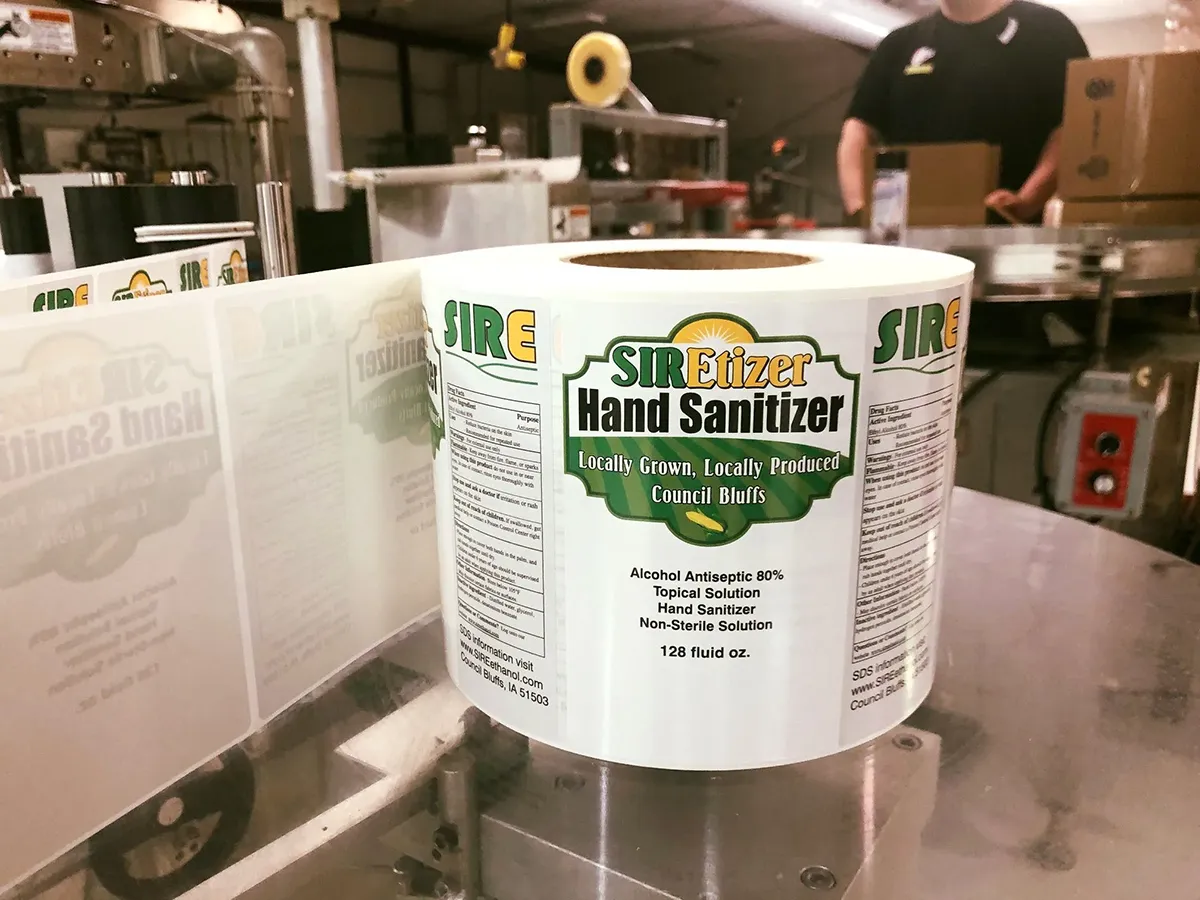Blog

Cookies Food Products Bottles Hand Sanitizer Made With Ethanol
Posted By: Cookies Sauces & Seasonings / April 26, 2020 / Category: News
Cookies Food Products temporarily suspends production of sauce to bottle ethanol-based sanitizer.
(Wall Lake, Iowa) — Going with the flow takes on a whole new meaning in times like this COVID-19 pandemic. It also explains why ethanol-based hand sanitizer has been flowing through the bottling line instead of barbecue sauce at Cookies Food Products Inc. in Wall Lake.
“I’m a firm believer you have to pay rent for the space you occupy while you’re here on earth,” said Speed Herrig, who has grown Cookies Food Products into one of the largest regional sauce manufacturers in the country in the past 40 years. “We want to do what we can to help.”
That’s why Herrig didn’t hesitate to offer his company’s bottling resources when he heard that Southwest Iowa Renewable Energy (SIRE) near Council Bluffs was trying to fill bottles by hand with ethanol-based hand sanitizer it had produced. Filling bottles manually from large plastic totes was complicated and slow, especially when time is of the essence to help protect people’s health.
A few hundred gallons were shipped to the Wall Lake bottling facility for testing late last week, and they were able to tinker with some settings to get the sanitizer to run through the system normally used for sauces. Herrig says by Monday morning they were running at full speed.
Herrig says they were only a small piece of the whole operation, but he and his staff saw it as a way to help their fellow Iowans in a time of need.
More than 30 pallets of hand sanitizer will be shipped to Ankeny to be added to the state’s stockpile for distribution throughout Iowa.
Herrig knew there was a better way. Just as General Motors retooled some of its production lines to make ventilators during the COVID-19 pandemic, Cookies made some small modifications on its equipment so employees could fill jugs with hand sanitizer instead of barbecue sauce. The Cookies team filled 5,000 1-gallon jugs with hand sanitizer in a couple days in mid-April for SIRE.
“We’re fortunate to have a lot of long-term, experienced employees at Cookies, so it wasn’t too hard to make these changes,” Herrig said.
Corn-based solutions fuel innovation
By early April, hospitals and nursing homes in Iowa and beyond were desperately searching for hand sanitizer, as demand for the product soared. Ethanol plants that can make large batches of sanitizer’s main ingredient, alcohol, offered to help.
The U.S. Food and Drug Administration (FDA) has stringent production standards designed to protect the quality of medicines, food ingredients and dietary supplements. Previously, the agency prohibited many ethanol plants from using their alcohol that didn’t meet high quality specifications for use in drugs or beverages.
In response to the COVID-19 pandemic, however, FDA revised its regulations, noted Justin Schultz, SIRE regulatory manager, who was quoted in the Council Bluffs Nonpareil newspaper several weeks ago. With the FDA’s new guidelines, ethanol made at plants that produce fuel ethanol can be used in a product like hand sanitizer, if the ethanol contains no additional additives or chemicals. Ethanol plants must also ensure water purity and proper sanitation of equipment.
SIRE produces more than 130 million gallons of fuel-grade ethanol per year and consumes more than 44.6 million bushels of corn annually. After FDA revised its guidelines this spring, SIRE shipped a few hundred gallons of pre-mixed hand sanitizer to Cookies’ Wall Lake bottling facility in early April. Once the Cookies team readjusted some settings to ensure the sanitizer would flow through their bottling system properly, they began filling 5,000 1-gallon plastic jugs.
The jugs of hand sanitizer were shipped to the Des Moines area to increase the state’s stockpile for distribution throughout Iowa. Herrig is glad that more people will be able to get the hand sanitizer they need, without being at the mercy of con artists.
“I’ve seen scammers selling hand sanitizer for well over twice the price it should be,”Herrig said. “Changing $75 a gallon or $10 for an 8-ounce bottle is outrageous. I don’t want to see anyone price gouging.”
Giving back
While Herrig added that the Cookies team played a small role in the fight against COVID-19, they viewed this as a way to help their fellow Iowans in a time of need.
“We’ve enjoyed doing business in Iowa for many years through our sauce business, our automotive parts business and our golf cart business,” said Herrig, who opened an automotive parts and repair business in 1962 on his family’s farm near Wall Lake. “Iowa has been a good place for me, and I want to give back.”
**This article was written by Darcy Dougherty Maulsby for the The Messenger.
